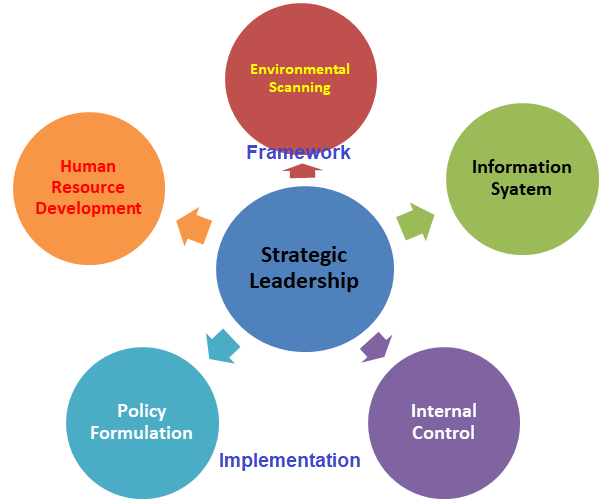Strategic Leadership is the ability to influence others to voluntarily make decisions that enhance the prospects for the organization’s long-term success while maintaining short-term financial stability. Different leadership approaches impact the vision and direction of growth and the potential success of an organization. To successfully deal with change, all executives need the skills and tools for both strategy formulation and implementation. Managing change and ambiguity requires strategic leaders who not only provide a sense of direction, but who can also build ownership and alignment within their workgroups to implement change.
Strategic Leadership can be defined as the ability of the top level managers or executives to determine the future courses of action and direction of the firm and motivate the members to make efforts in that direction.
Strategic leadership provides techniques that focus organizations when they are deciding on their purpose and best business practices that are critical for remaining competitive and relevant. Being able to learn and adapt has become vital for sustainability. Failure to be able to adapt to changing technology, climate change, and economic factors risks the organization becoming obsolete.
Strategic Leadership aims at inspiring others to make those decisions that bring better opportunities for the enterprise’s long-term success, without compromising its short-term financial stability.

Strategic Leadership is an intricate form of leadership, wherein the strategic leaders, i.e. managers or top-level executives design an organization structure, allocates resources, inspire employees to follow their ideas.
It encompasses the ability to envision, forecast and stimulate others to contribute to the implementation of strategic change in the organization.
Strategic Leader
A strategic leader is someone who determines the organization’s strategies and actions and makes every effort to implement it, in an intended manner.
In general, the manager acts as a strategic leader in the organization, who foresees and interprets, the dynamic business environment and work on issues that can influence and can be influenced by the events that occur to/with the organization.
Functions of Strategic Leader
- Setting the direction
- Strategic decision making
- Human capital management
- Translating strategies into actions
- Change Management
- Effective communication within the organization
- Ensuring efforts are made in the right direction.
- Developing strategic competencies.
- Framing policies and plans for the effective implementation of strategic decisions.
- Developing and maintaining a constructive work culture
The strategic leader has the following qualities – Open-mindedness, Foresightedness, Accountable, Risk-taking ability, Influential, Discipline, Endurance, Up-to-date, Self-control and Self Awareness.
Roles played by the strategic leader
- Navigator
A strategic leader identifies the major issues and its causes. Further, he/she always look for better opportunities, to affect actions.
- Strategist
As a strategist, he/she develops such strategies which have a long range view and establish those objectives which suit the organization’s vision and mission.
- Entrepreneur
A strategic leader has the risk-taking ability, who takes risks after completely analysing it. For this purpose, he/she always looks for opportunities and exploit them at the right time.
- Change Agent
As a change agent, he/she initiates changes in the organization, wherever required. And to do so, first of all, he/she makes sure that the members of the organization realize the need for change so that they can accept it positively and the changes are successfully implemented.
- Motivator
A strategic leader plays the role of a motivator, by attracting, developing, encouraging and retaining talent in the organization, to make sure that the organization possess the best human resource.
- Captivator
As a captivator, the strategic leader aims at developing passion, dedication, persistence and commitment towards the common goals, by influencing them in a way that people get ready to follow the vision.
Apart from these roles a strategic leader also plays the role of a visionary, policy maker, crisis manager, spokesperson, process integrator, mobilizer, enterprise guardian etc.
To conclude, Strategic leaders can create vision, express vision, passionately possess vision and persistently drive it to accomplishment.